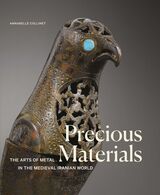356 start with M start with M
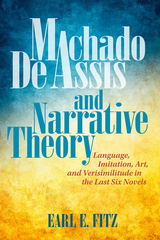
Published by Bucknell University Press. Distributed worldwide by Rutgers University Press.
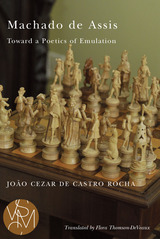
At the center of this alternative explanation, Castro Rocha situates the fallout from the success enjoyed by Eça de Queirós with the publication of Cousin Basílio and Machado’s two long texts condemning the author and his work. Literary and aesthetic rivalries come to the fore, allowing for a new theoretical framework based on a literary appropriation of “thick description,” the method proposed by anthropologist Clifford Geertz. From this method, Castro Rocha derives his key hypothesis: an unforeseen consequence of Machado’s reaction to Eça’s novel was a return to the classical notion of aemulatio, which led Machado to develop a “poetics of emulation.”
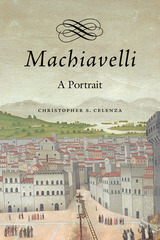
“Machiavellian”—used to describe the ruthless cunning of the power-obsessed and the pitiless—is never meant as a compliment. But the man whose name became shorthand for all that is ugly in politics was more engaging and nuanced than his reputation suggests. Christopher S. Celenza’s Machiavelli: A Portrait removes the varnish of centuries to reveal not only the hardnosed political philosopher but the skilled diplomat, learned commentator on ancient history, comic playwright, tireless letter writer, and thwarted lover.
Machiavelli’s hometown was the epicenter of the Italian Renaissance in the fifteenth century, a place of unparalleled artistic and intellectual attainments. But Florence was also riven by extraordinary violence. War and public executions were commonplace—Machiavelli himself was imprisoned and brutally tortured at the behest of his own government. These experiences left a deep impression on this keen observer of power politics, whose two masterpieces—The Prince and The Discourses—draw everywhere on the hard-won wisdom gained from navigating a treacherous world. But like many of Machiavelli’s fellow Florentines, he also immersed himself in the Latin language and wisdom of authors from the classical past. And for all of Machiavelli’s indifference to religion, vestiges of Christianity remained in his thought, especially the hope for a redeemer—a prince who would provide the stability so rare in Machiavelli’s worldly experience.
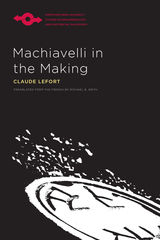
Machiavelli in the Making is both a novel interpretation of the Florentine’s work and a critical document for understanding influential French scholar and public intellectual Claude Lefort’s later writings on democracy and totalitarianism. Lefort extricates Machiavelli’s thought from the dominant interpretations of him as the founder of “objective” political science, which, having liberated itself from the religious and moralizing tendencies of medieval political reflection, attempts to arrive at a realistic discourse on the operations of raw power. Lefort ultimately finds that Machiavelli’s discourse opens the “place of the political” which had previously been occupied by theology and morality.
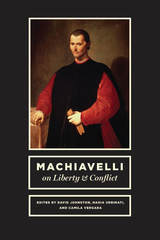
With Machiavelli on Liberty and Conflict, David Johnston, Nadia Urbinati, and Camila Vergara have brought together the most recent research on The Prince, with contributions from many of the leading scholars of Machiavelli, including Quentin Skinner, Harvey Mansfield, Erica Benner, John McCormick, and Giovanni Giorgini. Organized into four sections, the book focuses first on Machiavelli’s place in the history of political thought: Is he the last of the ancients or the creator of a new, distinctly modern conception of politics? And what might the answer to this question reveal about the impact of these disparate traditions on the founding of modern political philosophy? The second section contrasts current understandings of Machiavelli’s view of virtues in The Prince. The relationship between political leaders, popular power, and liberty is another perennial problem in studies of Machiavelli, and the third section develops several claims about that relationship. Finally, the fourth section explores the legacy of Machiavelli within the republican tradition of political thought and his relevance to enduring political issues.
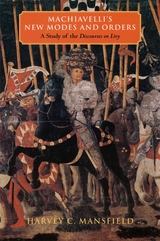
Mansfield's aim is to discern Machiavelli's intention in writing the book: he argues that Machiavelli wanted to introduce new modes and orders in political philosophy in order to make himself the founder of modern politics. Mansfield maintains that Machiavelli deliberately concealed part of his intentions so that only the most perceptive reader could see beneath the surface of the text and understand the whole of his book. Previously out of print, Mansfield's penetrating study brings to light the hidden thoughts lurking in the details of the Discourses on Livy to inform and challenge its readers at every step along the way.
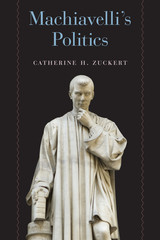
Starting with Machiavelli’s two major political works, Zuckert persuasively shows that the moral revolution Machiavelli sets out in The Prince lays the foundation for the new form of democratic republic he proposes in the Discourses. Distrusting ambitious politicians to serve the public interest of their own accord, Machiavelli sought to persuade them in The Prince that the best way to achieve their own ambitions was to secure the desires and ambitions of their subjects and fellow citizens. In the Discourses, he then describes the types of laws and institutions that would balance the conflict between the two in a way that would secure the liberty of most, if not all. In the second half of her book, Zuckert places selected later works—La Mandragola, The Art of War, The Life of Castruccio Castracani, Clizia, and Florentine Histories—under scrutiny, showing how Machiavelli further developed certain aspects of his thought in these works. In The Art of War, for example, he explains more concretely how and to what extent the principles of organization he advanced in The Prince and the Discourses ought to be applied in modern circumstances. Because human beings act primarily on passions, Machiavelli attempts to show readers what those passions are and how they can be guided to have productive rather than destructive results.
A stunning and ambitious analysis, Machiavelli’s Politics brilliantly shows how many conflicting perspectives do inform Machiavelli’s teachings, but that one needs to consider all of his works in order to understand how they cohere into a unified political view. This is a magisterial work that cannot be ignored if a comprehensive understanding of the philosopher is to be obtained.
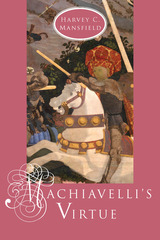
"The book brings together essays that have mapped [Mansfield's] paths of reflection over the past thirty years. . . . The ground, one would think, is ancient and familiar, but Mansfield manages to draw out some understandings, or recognitions, jarringly new."—Hadley Arkes, New Criterion
"Mansfield's book more than rewards the close reading it demands."—Colin Walters, Washington Times
"[A] masterly new book on the Renaissance courtier, statesman and political philosopher. . . . Mansfield seeks to rescue Machiavelli from liberalism's anodyne rehabilitation."—Roger Kimball, The Wall Street Journal

On the social consequences of machines
Automation, animation, and ecosystems are terms of central media-philosophical concern in today’s society of humans and machines. This volume describes the social consequences of machines as a mediating concept for the animation of life and automation of technology. Bernard Stiegler’s automatic society illustrates how digital media networks establish a new proletariat of knowledge workers. Gertrud Koch offers the animation of the technical to account for the pathological relations that arise between people and their devices. And Thomas Pringle synthesizes how automation and animation explain the history of intellectual exchanges that led to the hybrid concept of the ecosystem, a term that blends computer and natural science. All three contributions analyse how categories of life and technology become mixed in governmental policies, economic exploitation and pathologies of everyday life thereby both curiously and critically advancing the term that underlies those new developments: ‘machine.’
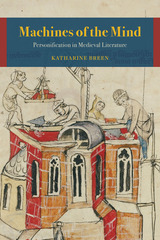
In Machines of the Mind, Katharine Breen proposes that medieval personifications should be understood neither as failed novelistic characters nor as instruments of heavy-handed didacticism. She argues that personifications are instead powerful tools for thought that help us to remember and manipulate complex ideas, testing them against existing moral and political paradigms. Specifically, different types of medieval personification should be seen as corresponding to positions in the rich and nuanced medieval debate over universals. Breen identifies three different types of personification—Platonic, Aristotelian, and Prudentian—that gave medieval writers a surprisingly varied spectrum with which to paint their characters.
Through a series of new readings of major authors and works, from Plato to Piers Plowman, Breen illuminates how medieval personifications embody the full range of positions between philosophical realism and nominalism, varying according to the convictions of individual authors and the purposes of individual works. Recalling Gregory the Great’s reference to machinae mentis (machines of the mind), Breen demonstrates that medieval writers applied personification with utility and subtlety, employing methods of personification as tools that serve different functions. Machines of the Mind offers insight for medievalists working at the crossroads of religion, philosophy, and literature, as well as for scholars interested in literary character-building and gendered relationships among characters, readers, and texts beyond the Middle Ages.
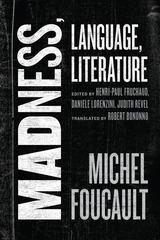
Perceiving an enigmatic relationship between madness, language, and literature, French philosopher Michel Foucault developed ideas during the 1960s that are less explicit in his later, more well-known writings. Collected here, these previously unpublished texts reveal a Foucault who undertakes an analysis of language and experience detached from their historical constraints. Three issues predominate: the experience of madness across societies; madness and language in Artaud, Roussel, and Baroque theater; and structuralist literary criticism. Not only do these texts pursue concepts unique to this period such as the “extra-linguistic,” but they also reveal a far more complex relationship between structuralism and Foucault than has typically been acknowledged.
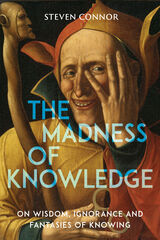
In an age of artificial intelligence, alternative facts, and mistrust of truth, The Madness of Knowledge offers an opulent, enlarging, and sometimes unnerving psychopathology of intellectual life.
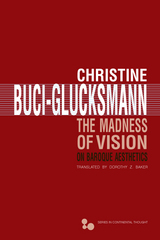
Christine Buci-Glucksmann’s The Madness of Vision is one of the most influential studies in phenomenological aesthetics of the baroque. Integrating the work of Merleau-Ponty with Lacanian psychoanalysis, Renaissance studies in optics, and twentieth-century mathematics, the author asserts the materiality of the body and world in her aesthetic theory. All vision is embodied vision, with the body and the emotions continually at play on the visual field. Thus vision, once considered a clear, uniform, and totalizing way of understanding the material world, actually dazzles and distorts the perception of reality.
In each of the nine essays that form The Madness of Vision Buci-Glucksmann develops her theoretical argument via a study of a major painting, sculpture, or influential visual image—Arabic script, Bettini’s “The Eye of Cardinal Colonna,” Bernini’s Saint Teresa and his 1661 fireworks display to celebrate the birth of the French dauphin, Caravaggio’s Judith Beheading Holofernes, the Paris arcades, and Arnulf Rainer’s self-portrait, among others—and deftly crosses historical, national, and artistic boundaries to address Gracián’s El Criticón; Monteverdi’s opera Orfeo; the poetry of Hafiz, John Donne, and Baudelaire; as well as baroque architecture and Anselm Kiefer’s Holocaust paintings. In doing so, Buci-Glucksmann makes the case for the pervasive influence of the baroque throughout history and the continuing importance of the baroque in contemporary arts.
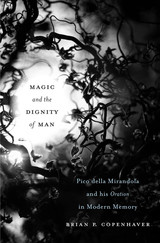
“This book is nothing less than the definitive study of a text long considered central to understanding the Renaissance and its place in Western culture.”
—James Hankins, Harvard University
Pico della Mirandola died in 1494 at the age of thirty-one. During his brief and extraordinary life, he invented Christian Kabbalah in a book that was banned by the Catholic Church after he offered to debate his ideas on religion and philosophy with anyone who challenged him. Today he is best known for a short speech, the Oration on the Dignity of Man, written in 1486 but never delivered. Sometimes called a “Manifesto of the Renaissance,” this text has been regarded as the foundation of humanism and a triumph of secular rationality over medieval mysticism.
Brian Copenhaver upends our understanding of Pico’s masterwork by re-examining this key document of modernity. An eminent historian of philosophy, Copenhaver shows that the Oration is not about human dignity. In fact, Pico never wrote an Oration on the Dignity of Man and never heard of that title. Instead he promoted ascetic mysticism, insisting that Christians need help from Jews to find the path to heaven—a journey whose final stages are magic and Kabbalah. Through a rigorous philological reading of this much-studied text, Copenhaver transforms the history of the idea of dignity and reveals how Pico came to be misunderstood over the course of five centuries. Magic and the Dignity of Man is a seismic shift in the study of one of the most remarkable thinkers of the Renaissance.
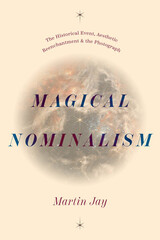
In this magisterial new book, intellectual historian Martin Jay traces the long-standing competition between two versions of nominalism—“conventional” and what he calls “magical.” According to Jay, since at least William of Ockham, the conventional form of nominalism contributed to the disenchantment of the world by viewing general terms as nothing more than mere names we use to group particular objects together, rejecting the idea that they refer to a further, “higher” reality. Magical nominalism, instead, performs a reenchanting function by investing proper names, disruptive events, and singular objects with an auratic power of their own. Drawing in part on Jewish theology, it challenges the elevation of the constitutive subject resulting from Ockham’s reliance on divine will in his critique of real universals.
Starting with the 14th-century revolution of nominalism against Scholastic realism, Jay unpacks various “counterrevolutions” against nominalism itself, including a magical alternative to its conventional form. Focusing on fundamental debates over the relationship between language, thought, and reality, Jay illuminates connections across thinkers, disciplines, and vast realms of human experience. Ranging from theology and philosophy of history to aesthetics and political theory, this book engages with a range of artists and thinkers, including Adorno, Ankersmit, Badiou, Barthes, Bataille, Benjamin, Blumenberg, Derrida, Duchamp, Foucault, Kracauer, Kripke and Lyotard. It places photography in a suggestive new discursive context. Ultimately, Magical Nominalism offers a strikingly original way to understand humanity’s intellectual path to modernity along with its vicissitudes.
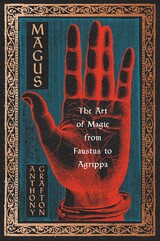
A revelatory new account of the magus—the learned magician—and his place in the intellectual, social, and cultural world of Renaissance Europe.
In literary legend, Faustus is the quintessential occult personality of early modern Europe. The historical Faustus, however, was something quite different: a magus—a learned magician fully embedded in the scholarly currents and public life of the Renaissance. And he was hardly the only one. Anthony Grafton argues that the magus in sixteenth-century Europe was a distinctive intellectual type, both different from and indebted to medieval counterparts as well as contemporaries like the engineer, the artist, the Christian humanist, and the religious reformer. Alongside these better-known figures, the magus had a transformative impact on his social world.
Magus details the arts and experiences of learned magicians including Marsilio Ficino, Pico della Mirandola, Johannes Trithemius, and Heinrich Cornelius Agrippa. Grafton explores their methods, the knowledge they produced, the services they provided, and the overlapping political and social milieus to which they aspired—often, the circles of kings and princes. During the late fifteenth and early sixteenth centuries, these erudite men anchored debates about licit and illicit magic, the divine and the diabolical, and the nature of “good” and “bad” magicians. Over time, they turned magic into a complex art, which drew on contemporary engineering as well as classical astrology, probed the limits of what was acceptable in a changing society, and promised new ways to explore the self and exploit the cosmos.
Resituating the magus in the social, cultural, and intellectual order of Renaissance Europe, Grafton sheds new light on both the recesses of the learned magician’s mind and the many worlds he inhabited.

Moses Maimonides was the most significant Jewish thinker, jurist, and doctor of the Middle Ages. Author of both a monumental code of Jewish law and the most influential and controversial work of Jewish philosophy, Maimonides looms larger than any other figure in the Jewish Middle Ages.
The essays in this volume were written to mark the 800th anniversary of Maimonides’s death in 1204. Written by the leading scholars in the field, they cover all aspects of Maimonides’s work and infuence. From his work on Jewish law to his unique understanding of God; from his view of the soul to his understanding of other religions; from his influence on Jewish scholars in the eastern Mediterranean to his impact on the emergence of modern Judaism—the essays in this volume cover all this and more. It is an indispensable collection for all those interested in the history of Judaism over the last 800 years.
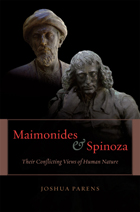
Until the last century, it was generally agreed that Maimonides was a great defender of Judaism, and Spinoza—as an Enlightenment advocate for secularization—among its key opponents. However, a new scholarly consensus has recently emerged that the teachings of the two philosophers were in fact much closer than was previously thought. In his perceptive new book, Joshua Parens sets out to challenge the now predominant view of Maimonides as a protomodern forerunner to Spinoza—and to show that a chief reason to read Maimonides is in fact to gain distance from our progressively secularized worldview.

The gulf between classical philosophy and the Torah made the task of Maimonides extraordinarily difficult. Weiss shows that Maimonides subtly preserves the tension between those traditions while producing a practical accommodation between them. To explain how Maimonides was able to accomplish this twofold goal, Weiss takes seriously the multilevel character of Maimonides' works. Weiss interprets Maimonides as a heterodox thinker who, with utter integrity, faces the Law's encounter with philosophy and gives both the Torah and philosophy their due.
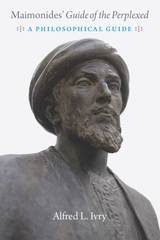
Drawing on a lifetime of study, Alfred L. Ivry has written the definitive guide to the Guide—one that makes it comprehensible and exciting to even those relatively unacquainted with Maimonides’ thought, while also offering an original and provocative interpretation that will command the interest of scholars. Ivry offers a chapter-by-chapter exposition of the widely accepted Shlomo Pines translation of the text along with a clear paraphrase that clarifies the key terms and concepts. Corresponding analyses take readers more deeply into the text, exploring the philosophical issues it raises, many dealing with metaphysics in both its ontological and epistemic aspects.
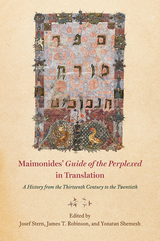
A collection of essays by scholars from a range of disciplines, the book unfolds in two parts. The first traces the history of the translations of the Guide, from medieval to modern renditions. The second surveys its influence in translation on Latin scholastic, early modern, and contemporary Anglo-American philosophy, as well as its impact in translation on current scholarship. Interdisciplinary in approach, this book will be essential reading for philosophers, historians, and religious studies scholars alike.
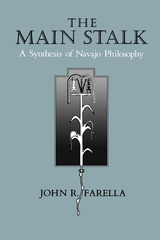
"This is a stimulating book. Essentially, it criticizes previous discussions of Navajo religion and philosophy for greatly underestimating their complexity and sophistication. . . . What the author discovers in Navajo thought is that the key concepts are interrelated in a grand, moral, ethical, philosophic, and cosmic unity." —American Anthropologist
"Discredits dualists, both non-Indian and Indian, who see simplistic oppositions of Good and Evil in Navajo culture and philosophy. The concept of walking in beauty, as related to the proper growth of the corn plant, unifies the book, and Farella does some impressive cross-cultural linguistic analysis to derive practical and ceremonial applications of these central Navajo metaphors. . . . This is one of the better books on Indian religion." —Choice

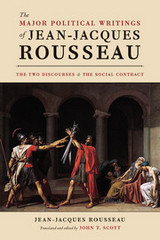
Individualist and communitarian. Anarchist and totalitarian. Classicist and romanticist. Progressive and reactionary. Since the eighteenth century, Jean-Jacques Rousseau has been said to be all of these things. Few philosophers have been the subject of as much or as intense debate, yet almost everyone agrees that Rousseau is among the most important and influential thinkers in the history of political philosophy. This new edition of his major political writings, published in the year of the three-hundredth anniversary of his birth, renews attention to the perennial importance of Rousseau’s work.
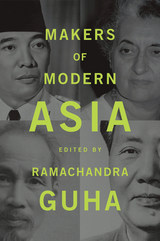
Hardly more than a decade old, the twenty-first century has already been dubbed the Asian Century in recognition of China and India’s increasing importance in world affairs. Yet discussions of Asia seem fixated on economic indicators—gross national product, per capita income, share of global trade. Makers of Modern Asia reorients our understanding of contemporary Asia by highlighting the political leaders, not billionaire businessmen, who helped launch the Asian Century.
The nationalists who crafted modern Asia were as much thinkers as activists, men and women who theorized and organized anticolonial movements, strategized and directed military campaigns, and designed and implemented political systems. The eleven thinker-politicians whose portraits are presented here were a mix of communists, capitalists, liberals, authoritarians, and proto-theocrats—a group as diverse as the countries they represent.
From China, the world’s most populous country, come four: Mao Zedong, leader of the Communist Revolution; Zhou Enlai, his close confidant; Deng Xiaoping, purged by Mao but rehabilitated to play a critical role in Chinese politics in later years; and Chiang Kai-shek, whose Kuomintang party formed the basis of modern Taiwan. From India, the world’s largest democracy, come three: Mohandas Gandhi, Jawaharlal Nehru, and Indira Gandhi, all of whom played crucial roles in guiding India toward independence and prosperity. Other exemplary nationalists include Vietnam’s Ho Chi Minh, Indonesia’s Sukarno, Singapore’s Lee Kuan Yew, and Pakistan’s Zulfiqar Ali Bhutto. With contributions from leading scholars, Makers of Modern Asia illuminates the intellectual and ideological foundations of Asia’s spectacular rise to global prominence.
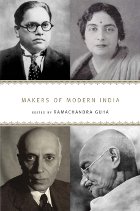
Modern India is the world's largest democracy, a sprawling, polyglot nation containing one-sixth of all humankind. The existence of such a complex and distinctive democratic regime qualifies as one of the world's bona fide political miracles. Furthermore, India's leading political thinkers have often served as its most influential political actors—think of Gandhi, whose collected works run to more than ninety volumes, or Ambedkar, or Nehru, who recorded their most eloquent theoretical reflections at the same time as they strove to set the delicate machinery of Indian democracy on a coherent and just path.
Out of the speeches and writings of these thinker-activists, Ramachandra Guha has built the first major anthology of Indian social and political thought. Makers of Modern India collects the work of nineteen of India's foremost generators of political sentiment, from those whose names command instant global recognition to pioneering subaltern and feminist thinkers whose works have until now remained obscure and inaccessible. Ranging across manifold languages and cultures, and addressing every crucial theme of modern Indian history—race, religion, language, caste, gender, colonialism, nationalism, economic development, violence, and nonviolence—Makers of Modern India provides an invaluable roadmap to Indian political debate.
An extensive introduction, biographical sketches of each figure, and guides to further reading make this work a rich resource for anyone interested in India and the ways its leading political minds have grappled with the problems that have increasingly come to define the modern world.
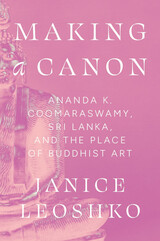
An early interpreter of Buddhist art to the West, Ananda Kentish Coomaraswamy laid the foundation of what would become the South Asian visual canon, particularly through his efforts to understand how Buddhist art emerged and developed. In Making a Canon, Janice Leoshko examines how Coomaraswamy’s experience as the director of a mineralogical survey in Sri Lanka shaped his understanding of South Asian art and religion. Along the way, she reveals how Coomaraswamy’s distinctive repetition of Sri Lankan visual images in his work influenced the direction of South Asia’s canon formation and left a lasting impression on our understanding of Buddhist art.
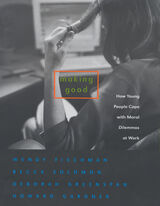
You're young, ambitious, entering the field of your dreams; you're on your own, the competition is fierce--and then you see your chance: the big story, the big role, the big discovery. But you'll have to cut a few corners, bend the rules, cheat a bit. What choices will you make?
After studying more than a hundred young people launching their careers, these longtime researchers of "good work"--work that is both skillful and honorable--find unsettling answers. Although young workers know what it takes to do good work, they don't always feel they can follow the ethical route. "Later, when I'm successful," is their implicit promise.
Making Good explores the choices confronting young workers who join the ranks of three dynamic professions--journalism, science, and acting--and looks at how the novices navigate moral dilemmas posed by a demanding, frequently lonely, professional life. The authors also uncover striking comparisons between these young professionals and the veterans in their fields--most notably, older workers recall inspiring models and mentors, while today's beginners see themselves as on their own. With extensive insights into how young workers view their respective domains, the nature of their ambitions, the sacrifices they are willing to make, and the lines they are prepared to cross, this study will prove instructive to young employees and employers alike, as well as to those who wish to understand the shifting moral and social character of the working world.
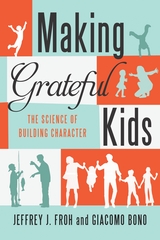
If there was a new wonder drug on the market that got kids to behave better, improve their grades, feel happier, and avoid risky behaviors, many parents around the world would be willing to empty their bank accounts to acquire it. Amazingly, such a product actually does exist. It’s not regulated by the FDA, it has no ill side-effects, and it’s absolutely free and available to anyone at any time. This miracle cure is gratitude.
Over the past decade, science has shown that gratitude is one of the most valuable and important emotions we possess, and it is a virtue that anyone can cultivate. In fact, researchers have developed many different methods people can use to foster an attitude of gratitude, and the science shows that many of them really work.
In Making Grateful Kids, two of the leading authorities on gratitude among young people, Jeffrey J. Froh and Giacomo Bono, introduce their latest and most compelling research, announce groundbreaking findings, and share real-life stories from adults and youth to show parents, teachers, mentors, and kids themselves how to achieve greater life satisfaction through gratitude. Most importantly perhaps, they expand on this groundbreaking research to offer practical and effective common-sense plans that can be used in day-to-day interactions between kids and adults to enhance success and wellbeing.
Their unique, scientifically-based approach for producing grateful youth works whether these kids are very young elementary school students or troubled teenagers. Not only does the purposeful practice of gratitude increase their happiness, but the research indicates that grateful kids also report more self-discipline, fulfilling relationships, and engagement with their schools and communities when compared to their less grateful counterparts. After reading Making Grateful Kids, parents, teachers, and anyone who works with youth will be able to connect more meaningfully with kids so that all parties can focus on the things that matter most and, in turn, create a more cooperative and thriving society.
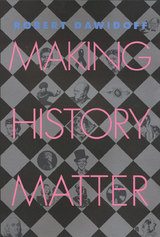
As a scholar of intellectual and cultural history, Dawidoff takes the stance that historians ought to take an active role in our democratic culture, informing and participating in public discourse. He argues for a broad reach when it comes to cultural expression, resisting the polarization of formal intellectual history and folk or commercial popular culture. In his view, Ralph Waldo Emerson and Katherine Hepburn are equally worthy topics for a historian's consideration, provided that they are treated with equal seriousness of purpose and analytic rigor. In "The Gay Nineties" section that closes the book, he traces key events in the continual struggle for gay and lesbian civil rights and takes on such unresolved issues as safer sex, needle exchange programs to control HIV transmission, and the public controversy around the portrayal of gay and lesbian television characters.
Divided into sections that deal with the patriarchs of American political and intellectual culture, expressive culture, and a historian's public voice, this book is a model of engaged and engaging writing. Accessible and witty, Making History Matter will appeal to general and academic readers interested in American history as well as gay and lesbian political and cultural issues.


What would something unlike us--a chimpanzee, say, or a computer--have to be able to do to qualify as a possible knower, like us? To answer this question at the very heart of our sense of ourselves, philosophers have long focused on intentionality and have looked to language as a key to this condition. Making It Explicit is an investigation into the nature of language--the social practices that distinguish us as rational, logical creatures--that revises the very terms of this inquiry. Where accounts of the relation between language and mind have traditionally rested on the concept of representation, this book sets out an alternate approach based on inference, and on a conception of certain kinds of implicit assessment that become explicit in language. Making It Explicit is the first attempt to work out in detail a theory that renders linguistic meaning in terms of use--in short, to explain how semantic content can be conferred on expressions and attitudes that are suitably caught up in social practices.
At the center of this enterprise is a notion of discursive commitment. Being able to talk--and so in the fullest sense being able to think--is a matter of mastering the practices that govern such commitments, being able to keep track of one's own commitments and those of others. Assessing the pragmatic significance of speech acts is a matter of explaining the explicit in terms of the implicit. As he traces the inferential structure of the social practices within which things can be made conceptually explicit, the author defines the distinctively expressive role of logical vocabulary. This expressive account of language, mind, and logic is, finally, an account of who we are.
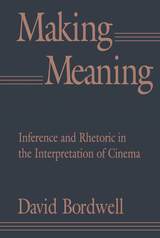
David Bordwell’s new book is at once a history of film criticism, an analysis of how critics interpret film, and a proposal for an alternative program for film studies. It is an anatomy of film criticism meant to reset the agenda for film scholarship. As such Making Meaning should be a landmark book, a focus for debate from which future film study will evolve.
Bordwell systematically maps different strategies for interpreting films and making meaning, illustrating his points with a vast array of examples from Western film criticism. Following an introductory chapter that sets out the terms and scope of the argument, Bordwell goes on to show how critical institutions constrain and contain the very practices they promote, and how the interpretation of texts has become a central preoccupation of the humanities. He gives lucid accounts of the development of film criticism in France, Britain, and the United States since World War II; analyzes this development through two important types of criticism, thematic-explicatory and symptomatic; and shows that both types, usually seen as antithetical, in fact have much in common. These diverse and even warring schools of criticism share conventional, rhetorical, and problem-solving techniques—a point that has broad-ranging implications for the way critics practice their art. The book concludes with a survey of the alternatives to criticism based on interpretation and, finally, with the proposal that a historical poetics of cinema offers the most fruitful framework for film analysis.
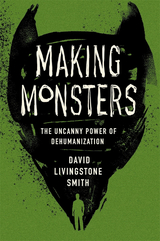
Shortlisted for the Nayef Al-Rodhan Book Prize.
A leading scholar explores what it means to dehumanize others—and how and why we do it.
“I wouldn’t have accepted that they were human beings. You would see an infant who’s just learning to smile, and it smiles at you, but you still kill it.” So a Hutu man explained to an incredulous researcher, when asked to recall how he felt slaughtering Tutsis in Rwanda in 1994. Such statements are shocking, yet we recognize them; we hear their echoes in accounts of genocides, massacres, and pogroms throughout history. How do some people come to believe that their enemies are monsters, and therefore easy to kill?
In Making Monsters David Livingstone Smith offers a poignant meditation on the philosophical and psychological roots of dehumanization. Drawing on harrowing accounts of lynchings, Smith establishes what dehumanization is and what it isn’t. When we dehumanize our enemy, we hold two incongruous beliefs at the same time: we believe our enemy is at once subhuman and fully human. To call someone a monster, then, is not merely a resort to metaphor—dehumanization really does happen in our minds. Turning to an abundance of historical examples, Smith explores the relationship between dehumanization and racism, the psychology of hierarchy, what it means to regard others as human beings, and why dehumanizing others transforms them into something so terrifying that they must be destroyed.
Meticulous but highly readable, Making Monsters suggests that the process of dehumanization is deeply seated in our psychology. It is precisely because we are all human that we are vulnerable to the manipulations of those trading in the politics of demonization and violence.
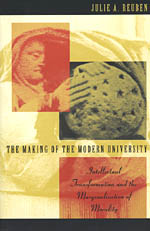
Based on extensive research at eight universities—Harvard, Yale, Columbia, Johns Hopkins, Chicago, Stanford, Michigan, and California at Berkeley—Reuben examines the aims of university reformers in the context of nineteenth-century ideas about truth. She argues that these educators tried to apply new scientific standards to moral education, but that their modernization efforts ultimately failed. By exploring the complex interaction between institutional and intellectual change, Reuben enhances our understanding of the modern university, the secularization of intellectual life, and the association of scientific objectivity with value-neutrality.

The sociology of science is dominated today by relativists who boldly argue that the content of science is not influenced by evidence from the empirical world but is instead socially constructed in the laboratory. Making Science is the first serious critique by a sociologist of the social constructivist position.
Stephen Cole begins by making a distinction between two kinds of knowledge: the core, which consists of those contributions that have passed the test of evaluation and are universally accepted as true and important, and the research frontier, which is composed of all work in progress that is still under evaluation. Of the thousands of scientific contributions made each year, only a handful end up in the core. What distinguishes those that are successful?
Agreeing with the constructivists, Cole argues that there exists no set of rules that enables scientists to certify the validity of frontier knowledge. This knowledge is “underdetermined” by the evidence, and therefore social factors—such as professional characteristics and intellectual authority—can and do play a crucial role in its evaluation. But Cole parts company with the constructivists when he asserts that it is impossible to understand which frontier knowledge wins a place in the core without first considering the cognitive characteristics of the contributions. He concludes that although the focus of scientific research, the rate of advance, and indeed the everyday making of science are influenced by social variables and processes, the content of the core of science is constrained by nature. In Making Science, Cole shows how social variables and cognitive variables interact in the evaluation of frontier knowledge.
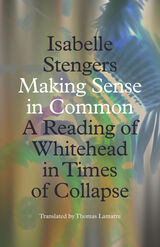
A leading philosopher seeks to recover “common sense” as a meeting place to reconcile science and philosophy
With her previous books on Alfred North Whitehead, Isabelle Stengers not only secured a reputation as one of the premier philosophers of our times but also inspired a rethinking of critical theory, political thought, and radical philosophy across a range of disciplines. Here, Stengers unveils what might well be seen as her definitive reading of Whitehead.
Making Sense in Common will be greeted eagerly by the growing group of scholars who use Stengers’s work on Whitehead as a model for how to think with conceptual precision through diverse domains of inquiry: environmentalism and ecology, animal studies, media and technology studies, the history and philosophy of science, feminism, and capitalism. On the other hand, the significance of this new book extends beyond Whitehead. Instead, it lies in Stengers’s recovery of the idea of “common sense” as a meeting place—a commons—where opposed ideas of science and humanistic inquiry can engage one another and help to move society forward. Her reconciliation of science and philosophy is especially urgent today—when climate disaster looms all around us, when the values of what we thought of as civilization and modernity are discredited, and when expertise of any kind is under attack.
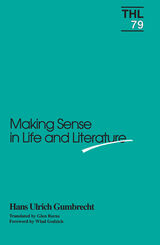


Sport dominates television and the mass media. Politics and business are a-bustle with sports metaphors. Endorsements by athletes sell us products. "Home run," "slam dunk," and the rest of the vocabulary of sport color daily conversation. Even in times of crisis and emergency, the media reports the scores and highlights.
Marky Dyreson delves into how our obsession with sport came into being with a close look at coverage of the Olympic Games between 1896 and 1912. How people reported and consumed information on the Olympics offers insight into how sport entered the heart of American culture as part of an impetus for social reform. Political leaders came to believe in the power of sport to revitalize the "republican experiment." Sport could instill a new sense of national identity that would forge a new sense of community and a healthy political order while at the same time linking America's intellectual and power elite with the experiences of the masses.

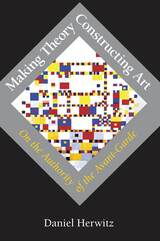
Spurred by the theoretical claims of Arthur Danto, a leader in the philosophy of the avant-garde, Herwitz reexamines the art and theory of major figures in the avant-garde movement including John Cage, Jean-François Lyotard, Jean Baudrillard, and Andy Warhol.
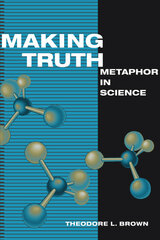
To illustrate the roles of metaphor in science, Brown presents a series of studies of scientific systems. These range from the atom, historically one of the most important ideas in science, through models in chemistry and biology, including current “hot” topics such as protein folding, chaperone proteins, and global warming. The case studies in Making Truth illustrate the deeply metaphorical nature of scientific reasoning and communication. They provide the basis for far-reaching conclusions about science as an intellectual and social practice and about the nature of scientific truth.
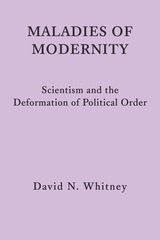
“Chief among the spiritually blighting tendencies of the age is materialist reductionism parading as scientific orthodoxy. David Whitney powerfully explores this movement and habit of mind as it takes its rise in the form of scientism, especially from Sir Francis Bacon’s NEW ATLANTIS in the 17th century and finds full fruition in the positivist teachings of August Comte in the 19th century—a preamble to the behavioralist dogmas of our own time. The openness to the facts of experience characteristic of all science as a search for the truth of reality in all its dimensions and diversity is thereby effectively abandoned in favor of an unrelenting insistence on a restrictive methodology ostensibly grounded in phenomenal reality that is perversely made the touchstone of all valid inquiry. The consequences are philosophically as well as politically disastrous, as Whitney brilliantly demonstrates in this path-breaking study.”
– Ellis Sandoz, Founder of the Eric Voegelin Institute for American Renaissance Studies
"David Whitney’s excellent critique of what he calls scientism, a dogmatic application of the methods of natural science to social science, provides a high-brow diagnosis of the modern maladies that result from the “rhetorical power of science.”
–– Scott Robinson, voegelinview
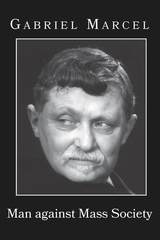
The central theme of this important book is that we are paying the price of an arrogance that refuses to recognize mystery. The author invites the reader to enter into the argument that he holds with himself on a great number of problems. Written in the early 1950s, Marcel’s discussion of these topics are remarkably contemporary, e.g.:
* Our crisis is a metaphysical, not merely social, one.
* What a man is depends partly on what he thinks he is, and a materialistic philosophy turns men into things.
* Can a man be free except in a free country?
* Stoicism is no longer a workable philosophy because today pressure can be put on the mind as well as on the body.
* Technical progress is not evil in itself, but a technique is a means that, regarded as an end, can become either an idol or an excuse for self-idolatry. State control of scientific research, leading to a concentration on new means of destruction, is a calamity.
* Fanaticism is an opinion that refuses to argue, and so the fanatic is an enemy of truth.
* The kind of unification that science is bringing about today is really an ironing out of differences, but the only valuable kind of unity is one that implies a respect for differences.
* We must beware of thinking in terms of great numbers and so blinding ourselves to the reality of individual suffering. Our philosophical approach to being is made possible only by our practical approach to our neighbor.
* We must encourage the spirit of fraternity and distrust the kind of egalitarianism that is based on envy and resentment.
* No man however humble should feel that he cannot spread the light among his friends. No easy solution is offered, but the author conveys his own faith that ultimately love and intelligence will triumph.
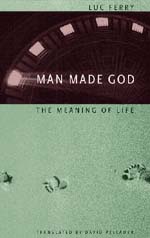
Luc Ferry argues that modernity and the emergence of secular humanism in Europe since the eighteenth century have not killed the search for meaning and the sacred, or even the idea of God, but rather have transformed both through a dual process: the humanization of the divine and the divinization of the human. Ferry sees evidence for the first of these in the Catholic Church's attempts to counter the growing rejection of dogmatism and to translate the religious tradition into contemporary language. The second he traces to the birth of modern love and humanitarianism, both of which demand a concern for others and even self-sacrifice in defense of values that transcend life itself. Ferry concludes with a powerful statement in favor of what he calls "transcendental humanism"—a concept that for the first time in human history gives us access to a genuine spirituality rooted in human beings instead of the divine.
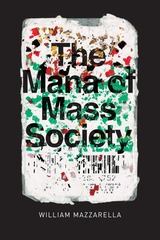
We often invoke the “magic” of mass media to describe seductive advertising or charismatic politicians. In The Mana of Mass Society, William Mazzarella asks what happens to social theory if we take that idea seriously. How would it change our understanding of publicity, propaganda, love, and power?
Mazzarella reconsiders the concept of “mana,” which served in early anthropology as a troubled bridge between “primitive” ritual and the fascination of mass media. Thinking about mana, Mazzarella shows, means rethinking some of our most fundamental questions: What powers authority? What in us responds to it? Is the mana that animates an Aboriginal ritual the same as the mana that energizes a revolutionary crowd, a consumer public, or an art encounter? At the intersection of anthropology and critical theory, The Mana of Mass Society brings recent conversations around affect, sovereignty, and emergence into creative contact with classic debates on religion, charisma, ideology, and aesthetics.
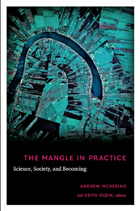
The Mangle in Practice opens with a fresh introduction to the mangle by Pickering. Several contributors then present empirical studies that demonstrate the mangle’s applicability to topics as diverse as pig farming, Chinese medicine, economic theory, and domestic-violence policing. Other contributors offer examples of the mangle in action: real-world practices that implement a self-consciously “mangle-ish” stance in environmental management and software development. Further essays discuss the mangle as philosophy and social theory. As Pickering argues in the preface, the mangle points to a shift in interpretive sensibilities that makes visible a world of de-centered becoming. This volume demonstrates the viability, coherence, and promise of such a shift, not only in science and technology studies, but in the social sciences and humanities more generally.
Contributors: Lisa Asplen, Dawn Coppin, Adrian Franklin, Keith Guzik, Casper Bruun Jensen,Yiannis Koutalos, Brian Marick, Randi Markussen, Andrew Pickering, Volker Scheid, Esther-Mirjam Sent, Carol Steiner, Maxim Waldstein
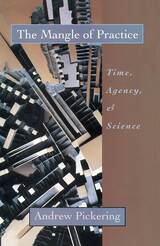
Andrew Pickering offers a new approach to the unpredictable nature of change in science, taking into account the extraordinary number of factors—social, technological, conceptual, and natural—that interact to affect the creation of scientific knowledge. In his view, machines, instruments, facts, theories, conceptual and mathematical structures, disciplined practices, and human beings are in constantly shifting relationships with one another—"mangled" together in unforeseeable ways that are shaped by the contingencies of culture, time, and place.
Situating material as well as human agency in their larger cultural context, Pickering uses case studies to show how this picture of the open, changeable nature of science advances a richer understanding of scientific work both past and present. Pickering examines in detail the building of the bubble chamber in particle physics, the search for the quark, the construction of the quarternion system in mathematics, and the introduction of computer-controlled machine tools in industry. He uses these examples to address the most basic elements of scientific practice—the development of experimental apparatus, the production of facts, the development of theory, and the interrelation of machines and social organization.

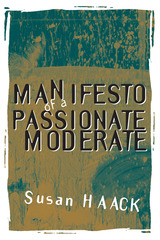
"The virtue of Haack's book, and I mean virtue in the ethical sense, is that it embodies the attitude that it exalts. . . Haack's voice is urbane, sensible, passionate—the voice of philosophy that matters. How good to hear it again."—Jonathan Rauch, Reason
"A tough mind, confident of its power, making an art of logic . . . a cool mastery."—Paul R. Gross, Wilson Quarterly
"Few people are better able to defend the notion of truth, and in strong, clear prose, than Susan Haack . . . a philosopher of great distinction."—Hugh Lloyd-Jones, National Review
"If you relish acute observation and straight talk, this is a book to read."—Key Reporter (Phi Beta Kappa)
"Everywhere in this book there is the refreshing breeze of common sense, patiently but inexorably blowing."—Roger Kimball, Times Literary Supplement
"A refreshing alternative to the extremism that characterizes so much rhetoric today."—Kirkus Reviews
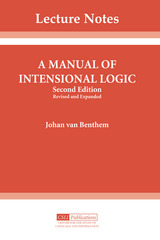

When William James died in 1910 he left a large body of manuscript material that has never appeared in print. Much of it is of biographical interest only, but the largest part is concerned with James's work. The present volume, the first of two that will bring The Works of William James to completion, includes the manuscripts devoted to work in progress on philosophical and psychological subjects. The last volume will bring together the manuscripts relating to James's public lectures and teaching.
The most important of these manuscripts are those of the years 1903 and 1904 called "The Many and the One." This was material for the book that James hoped would be the full technical exposition of his philosophy of radical empiricism. It contains discussions of problems and concepts that are not found in his published work. Closely related to this are his responses to the so-called Miller-Bode objections, which charged that his philosophy of pure experience could not solve the problem of the many and the one or the question "How can two minds know the same thing?" James's notes record his offers to work his way out of the impasse, which eventually led to his formulation of radical empiricism and his total rejection of the mind-body dualism that had dominated Western philosophy since Descartes.
The manuscripts in the rest of the volume contain James's reflections over a period of forty years in the form of drafts, memoranda, and notebook entries. The diverse subjects are arranged under the headings of Philosophy, Psychology, Aesthetics, Ethics, and Religion. Of special interest are the early notes in which James began to work out his own philosophical point of view.

This final volume of The Works of William James provides a full record of James's teaching career at Harvard from 1872 to 1907. It includes extensive working notes for lectures in more than twenty courses. Some of the notes contain summary statements of views of James's that have never been published before, such as his treatment of the question of proof in ethics, in the only course he ever taught in that subject; others reflect contemporary controversies in philosophy, notably the famous debate on Idealism and the nature of the Absolute; still others illuminate early stages of James's thinking on crucial problems in what was to become his philosophy of radical empiricism. Often the notes yield information about his sources that is not to be found in the published writings. Because James's teaching was so closely involved with the development of his thought, this unpublished material adds a new dimension to our understanding of his philosophy.
James's public lectures gained him world renown, and most of them were subsequently published. There are, however, several sets of notes for and drafts of important lectures that he never wrote out for publication; these are included in the present volume. Among them are his two series of lectures in 1878 on the physiology of the brain and its relation to the mind; the Lowell Lectures of 1896 on exceptional mental states; and the lectures of 1902 on intellect and feeling in religions, which were designed to supplement Varieties of Religious Experience and were intended to be his last word on the psychology of religion.
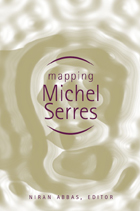
---Robert Harrison, Stanford University [blurb from review pending permission]
The work of Michel Serres---including the books Hermes, The Parasite, The Natural Contract, Genesis, The Troubadour of Knowledge, and Conversations on Science, Culture, and Time---has stimulated readers for years, as it challenges the boundaries of science, literature, culture, language, and epistemology. The essays in Mapping Michel Serres, written by the leading interpreters of his work, offer perspectives from a range of disciplinary positions, including literature, language studies, and cultural theory. Contributors include Maria Assad, Hanjo Berressem, Stephen Clucas, Steven Connor, Andrew Gibson, René Girard, Paul Harris, Marcel Hénaff, William Johnsen, William Paulson, Marjorie Perloff, Philipp Schweighauser, Isabella Winkler, and Julian Yates.
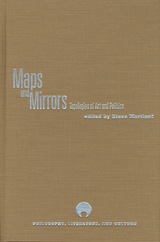

On October 10, 1941, the entire Jewish population of the Belarusian village of Krucha was rounded up and shot. While Nazi death squads routinely carried out mass executions on the Eastern Front, this particular atrocity was not the work of the SS but was committed by a regular German army unit acting on its own initiative. Marching into Darkness is a bone-chilling exposé of the ordinary footsoldiers who participated in the Final Solution on a daily basis.
Although scholars have exploded the myth that the Wehrmacht played no significant part in the Holocaust, a concrete picture of its involvement at the local level has been lacking. Among the crimes Waitman Wade Beorn unearths are forced labor, sexual violence, and graverobbing, though a few soldiers refused to participate and even helped Jews. By meticulously reconstructing the German army's activities in Belarus in 1941, Marching into Darkness reveals in stark detail how the army willingly fulfilled its role as an agent of murder on a massive scale. Early efforts at improvised extermination progressively became much more methodical, with some army units going so far as to organize "Jew hunts." Beorn also demonstrates how the Wehrmacht used the pretense of anti-partisan warfare as a subterfuge by reporting murdered Jews as partisans.
Through archival research into military and legal records, survivor testimonies, and eyewitness interviews, Beorn paints a searing portrait of a professional army's descent into ever more intimate participation in genocide.

Stoic musings of a philosopher-emperor at war.
Marcus Aurelius (AD 121–180), Roman emperor and Stoic philosopher, born at Rome, received training under his guardian and uncle emperor Antoninus Pius (reigned 138–161), who adopted him. He was converted to Stoicism and henceforward studied and practiced philosophy and law. A gentle man, he lived in agreement and collaboration with Antoninus Pius. He married Pius’ daughter and succeeded him as emperor in March 161, sharing some of the burdens with Lucius Verus.
Marcus’ reign soon saw fearful national disasters from flood, earthquakes, epidemics, threatened revolt (in Britain), a Parthian war, and pressure of barbarians north of the Alps. From 169 onwards he had to struggle hard against the German Quadi, Marcomani, Vandals, and others until success came in 174. In 175 (when Faustina died) he pacified affairs in Asia after a revolt by Avidius. War with Germans was renewed during which he caught some disease and died by the Danube in March 180.
The famous Meditations of Marcus Aurelius (not his title; he simply calls them “The matters addressed to himself”) are reflections written in periods of solitude during the emperor’s military campaigns. Originally intended for his private guidance and self-admonition, the Meditations have endured as a potent expression of Stoic belief. It is a central text for students of Stoicism as well as a unique personal guide to the moral life.

Margins in the Classroom was first published in 1994. Minnesota Archive Editions uses digital technology to make long-unavailable books once again accessible, and are published unaltered from the original University of Minnesota Press editions.
For today's teacher of literature, facing a minefield of politics and theory, this book arrives as a much needed guide through the multiplying cultural anxieties of the college classroom. Margins in the Classroom brings together established scholars and emerging voices from diverse backgrounds to show how politics and theory can and do affect the most pressing problems confronting the contemporary teacher of literature. The essays in this volume go beyond questioning and examining existing practices to suggest fresh approaches to teaching the expanding literary canon within the context of the politics of the educational institution.
Grounded in literary criticism, psychoanalysis, feminist theory, political economy, sociology, and philosophy, these essays apply new theoretical models to the traditional canon, identify new bodies of literature, and show how theory can be used to analyze these new literatures. Focusing on the politics of teaching and theory in the classroom, the authors explore the present practice and future implications of changing textual analysis, literary theory, and pedagogy. Their essays address the politics of literature as it affects the classroom, the design of courses, and the creation of new courses. They mold theory to the variety of classroom populations and materials the teacher of literature encounters today. The resulting volume bridges the differences between the languages of the classroom instructor and the contemporary theorist. Margins in the Classroom is unique in both the breadth and the depth of its concern over the disturbing, if electric, impact of changes in criticism, theory, and pedagogy in college literature classes as we approach the next century of academic instruction.Kostas Myrsiades is professor of comparative literature, and Linda S. Myrsiades is professor of English, both at West Chester University. Kostas Myrsiades is editor of College Literature, where Linda S. Myrsiades is an associate editor.
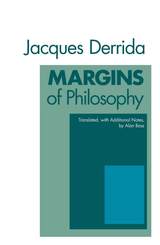
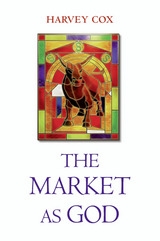
“Essential and thoroughly engaging…Harvey Cox’s ingenious sense of how market theology has developed a scripture, a liturgy, and sophisticated apologetics allow us to see old challenges in a remarkably fresh light.”
—E. J. Dionne, Jr.
We have fallen in thrall to the theology of supply and demand. According to its acolytes, the Market is omniscient, omnipotent, and omnipresent. It can raise nations and ruin households, and comes complete with its own doctrines, prophets, and evangelical zeal. Harvey Cox brings this theology out of the shadows, demonstrating that the way the world economy operates is shaped by a global system of values that can be best understood as a religion.
Drawing on biblical sources and the work of social scientists, Cox points to many parallels between the development of Christianity and the Market economy. It is only by understanding how the Market reached its “divine” status that can we hope to restore it to its proper place as servant of humanity.
“Cox argues that…we are now imprisoned by the dictates of a false god that we ourselves have created. We need to break free and reclaim our humanity.”
—Forbes
“Cox clears the space for a new generation of Christians to begin to develop a more public and egalitarian politics.”
—The Nation
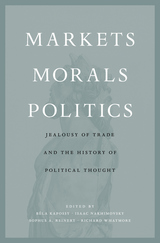
When István Hont died in 2013, the world lost a giant of intellectual history. A leader of the Cambridge School of Political Thought, Hont argued passionately for a global-historical approach to political ideas. To better understand the development of liberalism, he looked not only to the works of great thinkers but also to their reception and use amid revolution and interstate competition. His innovative program of study culminated in the landmark 2005 book Jealousy of Trade, which explores the birth of economic nationalism and other social effects of expanding eighteenth-century markets. Markets, Morals, Politics brings together a celebrated cast of Hont’s contemporaries to assess his influence, ideas, and methods.
Richard Tuck, John Pocock, John Dunn, Raymond Geuss, Gareth Stedman Jones, Michael Sonenscher, John Robertson, Keith Tribe, Pasquale Pasquino, and Peter N. Miller contribute original essays on themes Hont treated with penetrating insight: the politics of commerce, debt, and luxury; the morality of markets; and economic limits on state power. The authors delve into questions about the relationship between states and markets, politics and economics, through examinations of key Enlightenment and pre-Enlightenment figures in context—Hobbes, Rousseau, Spinoza, and many others. The contributors also add depth to Hont’s lifelong, if sometimes veiled, engagement with Marx.
The result is a work of interpretation that does justice to Hont’s influence while developing its own provocative and illuminating arguments. Markets, Morals, Politics will be a valuable companion to readers of Hont and anyone concerned with political economy and the history of ideas.

Interpretive social science and literary analysis converge in this absorbing book. It is a psychosocial drama in three acts, featuring three very different confrontations between nineteenth-century Americans and the natives of the Marquesas Islands. The Americans, in seeking to come to terms with the Marquesans, found their own cultural identity challenged; they were compelled, under conditions of extreme psychic stress, to discover what it meant to them to be civilized.
The protagonists are the Reverend William Alexander, who led a mission to the Marquesas to rescue the islanders from sin and savagery through the word of God; Captain David Porter, a rationalist intent upon civilizing the natives by educating them; and Herman Melville, seaman, who was held captive for a time by the Typees. The Calvinist, rationalist, and romantic preconceptions of the three were shaken by their experiences in the alien environment of Polynesia. Only Melville, however, came to investigate the civilized identity itself as a source of these shared consternations. T. Walter Herbert offers a fresh perspective on Melville's Typee by considering it in the context of the earlier encounters, and by drawing, as he does throughout, on the insights of cultural anthropology.

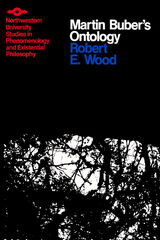
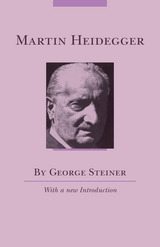
"It would be hard to imagine a better introduction to the work of philosopher Martin Heidegger."—George Kateb, The New Republic

One of the century’s greatest philosophers, without whom there would be no Sartre, no Foucault, no Frankfurt School, Martin Heidegger was also a man of great failures and flaws, a Faustus who made a pact with the devil of his time, Adolf Hitler. The story of Heidegger’s life and philosophy, a quintessentially German story in which good and evil, brilliance and blindness are inextricably entwined and the passions and disasters of a whole century come into play, is told in this brilliant biography.
Heidegger grew up in Catholic Germany where, for a chance at pursuing a life of learning, he pledged himself to the priesthood. Soon he turned apostate and sought a university position, which set him on the path to becoming the star of German philosophy in the 1920s. Rüdiger Safranski chronicles Heidegger’s rise along with the thought he honed on the way, with its debt to Heraclitus, Plato, and Kant, and its tragic susceptibility to the conservatism that emerged out of the nightmare of Germany’s loss in World War I. A chronicle of ideas and of personal commitments and betrayals, Safranski’s biography combines clear accounts of the philosophy that won Heidegger eternal renown with the fascinating details of the loves and lapses that tripped up this powerful intellectual.
The best intellectual biography of Heidegger ever written and a best-seller in Germany, Martin Heidegger: Between Good and Evil does not shy away from full coverage of Heidegger’s shameful transformation into a propagandist for the National Socialist regime; nor does it allow this aspect of his career to obscure his accomplishments. Written by a master of Heidegger’s philosophy, the book is one of the best introductions to the thought and to the life and times of the greatest German philosopher of the century.
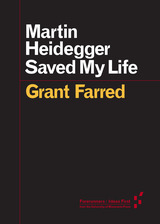
In Martin Heidegger Saved My Life, Grant Farred combines autobiography with philosophical rumination to offer this unusual meditation on American racism. In the fall of 2013 while raking leaves outside his home, Farred experienced a racist encounter: a white woman stopped to ask him, “Would you like another job?” Farred responded, “Only if you can match my Cornell faculty salary.” The moment, however, stuck with him. The black man had gravitated to, of all people, Martin Heidegger, specifically Heidegger’s pronouncement, “Only when man speaks, does he think—and not the other way around,” in order to unpack this encounter.
In this essay, Farred grapples with why it is that Heidegger—well known as a Nazi—resonates so deeply with him during this encounter instead of other, more predictable figures such as Malcolm X, W. E. B. DuBois, or Frantz Fanon.
Forerunners is a thought-in-process series of breakthrough digital works. Written between fresh ideas and finished books, Forerunners draws on scholarly work initiated in notable blogs, social media, conference plenaries, journal articles, and the synergy of academic exchange. This is gray literature publishing: where intense thinking, change, and speculation take place in scholarship.
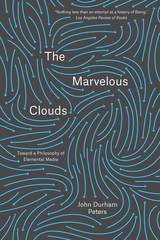
Peters defines media expansively as elements that compose the human world. Drawing from ideas implicit in media philosophy, Peters argues that media are more than carriers of messages: they are the very infrastructures combining nature and culture that allow human life to thrive. Through an encyclopedic array of examples from the oceans to the skies, The Marvelous Clouds reveals the long prehistory of so-called new media. Digital media, Peters argues, are an extension of early practices tied to the establishment of civilization such as mastering fire, building calendars, reading the stars, creating language, and establishing religions. New media do not take us into uncharted waters, but rather confront us with the deepest and oldest questions of society and ecology: how to manage the relations people have with themselves, others, and the natural world.
A wide-ranging meditation on the many means we have employed to cope with the struggles of existence—from navigation to farming, meteorology to Google—The Marvelous Clouds shows how media lie at the very heart of our interactions with the world around us. Peters’s book will not only change how we think about media but provide a new appreciation for the day-to-day foundations of life on earth that we so often take for granted.
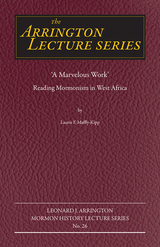
The Arrington Lecture series, established by one of the twentieth-century West's most distinguished historians, Leonard Arrington, has become a leading forum for prominent historians to address topics related to Mormon history. Utah State University hosts the Leonard J. Arrington Mormon History Lecture Series through the Merrill-Cazier Library Special Collections and Archives department.
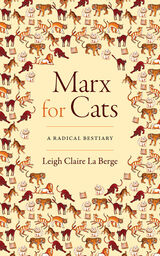
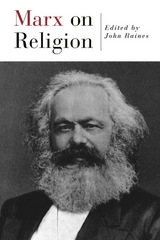
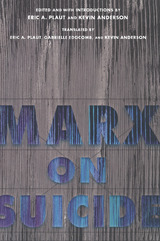
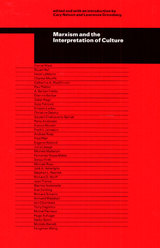
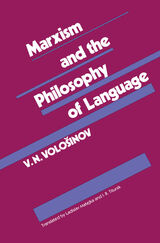
V. N. Vološinov’s important work, first published in Russian in 1929, had to wait a generation for recognition. This first paperback edition of the English translation will be capital for literary theorists, philosophers, linguists, psychologists, and many others.
Vološinov is out to undo the old disciplinary boundaries between linguistics, rhetoric, and poetics in order to construct a new kind of field: semiotics or textual theory. Ladislav Matejka and I. R. Titunik have provided a new preface to discuss Vološinov in relation to the great resurgence of interest in all the writing of the circle of Mikhail Bakhtin.
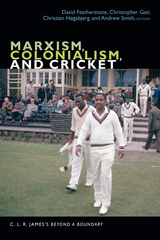
Contributors. Anima Adjepong, David Austin, Hilary McD. Beckles, Michael Brearley, Selwyn R. Cudjoe, David Featherstone, Christopher Gair, Paget Henry, Christian Høgsbjerg, C. L. R. James, Selma James, Roy McCree, Minkah Makalani, Clem Seecharan, Andrew Smith, Neil Washbourne, Claire Westall
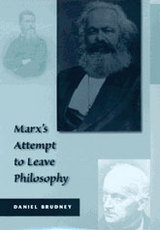
Daniel Brudney traces the development of post-Hegelian thought from Ludwig Feuerbach and Bruno Bauer to Karl Marx's work of 1844 and his Theses on Feuerbach, and concludes with an examination of The German Ideology. Brudney focuses on the transmutations of a set of ideas about human nature, the good life, and our relation to the world and to others; about how we end up with false beliefs about these matters; about whether one can, in a capitalist society, know the truth about these matters; and about the critique of capitalism which would flow from such knowledge.
Brudney shows how Marx, following Feuerbach, attempted to reveal humanity's nature and what would count as the good life, while eschewing and indeed polemicizing against "philosophy"--against any concern with metaphysics and epistemology. Marx attempted to avoid philosophy as early as 1844, and the central aims of his texts are the same right through The German Ideology. There is thus no break between an early and a late Marx; moreover, there is no "materialist" Marx, no Marx who subscribes to a metaphysical view, even in The German Ideology, the text canonically taken as the origin of Marxist materialism. Rather, in all the texts of this period Marx tries to mount a compelling critique of the present while altogether avoiding the dilemmas central to philosophy in the modern era.
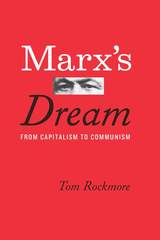
With Marx’s Dream, Tom Rockmore offers a much-needed alternative view, distinguishing rigorously between Marx and Marxism. Rockmore breaks with the Marxist view of Marx in three key ways. First, he shows that the concern with the relation of theory to practice—reflected in Marx’s famous claim that philosophers only interpret the world, while the point is to change it—arose as early as Socrates, and has been central to philosophy in its best moments. Second, he seeks to free Marx from his unsolicited Marxist embrace in order to consider his theory on its own merits. And, crucially, Rockmore relies on the normal standards of philosophical debate, without the special pleading to which Marxist accounts too often resort. Marx’s failures as a thinker, Rockmore shows, lie less in his diagnosis of industrial capitalism’s problems than in the suggested remedies, which are often unsound.
Only a philosopher of Rockmore’s stature could tackle a project this substantial, and the results are remarkable: a fresh Marx, unencumbered by doctrine and full of insights that remain salient today.
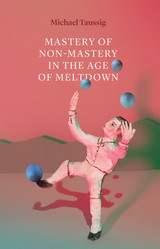
Taussig seeks to move us away from the manipulation of nature and reorient us to different metaphors and sources of inspiration to develop a new ethical stance toward the world. His ultimate goal is to undo his readers’ sense of control and engender what he calls “mastery of non-mastery.” This unique book developed out of Taussig’s work with peasant agriculture and his artistic practice, which brings performance art together with aspects of ritual. Through immersive meditations on Walter Benjamin, D. H. Lawrence, Emerson, Bataille, and Proust, Taussig grapples with the possibility of collapse and with the responsibility we bear for it.

Law is part of the process by which people construct their views of the world. In Material Law, distinguished scholar John Brigham focuses on the places where law and material life intersect, and how law creates and alters our social reality. Brigham looks at an eclectic group of bodies and things—from maps and territories and trends in courthouse architecture to a woman's womb and a judge's body— to make connections between the material and the legal.
Theoretically sophisticated, and consistently fascinating, Material Law integrates law and society, political science, and popular culture in a truly interdisciplinary fashion. Brigham examines how the meaning of law is influenced by politics, reviewing, for example, whether the authority of global law supersedes that of national law in the context of anglo-american cultural colonialism. What emerges is a well-reasoned look at how the authority of law constitutes what we see as real in our lives.

The “Twenty Verses on Manifestation-Only” of the Indian Buddhist philosopher Vasubandhu (c. 350–430?), his Viṁśíkā, is one of the most important treatises of the Yogācāra school. Accompanied by the author’s own commentary, the text lays out a vision of a “Buddhist Idealism” in which even one’s experience of the sufferings of hell is revealed to be nothing other than the results of working out one’s karma. Later scholars commented on the work a number of times, in its original Sanskrit, in Tibetan translation, and in three Chinese versions.
This book presents an edition and translation of the Sanskrit text of the core verses, alongside the original author’s commentary, based directly on the manuscript evidence. This is accompanied by an edition of the canonical translations of these texts found in the Tibetan Tanjurs, as well as a “draft translation” of the verses in Tibetan, found in a manuscript from Dunhuang. This publication therefore provides the most reliable and comprehensive philological accounting to date for this fundamental work.
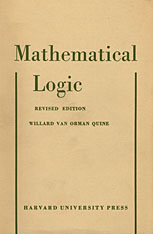
W. V. Quine’s systematic development of mathematical logic has been widely praised for the new material presented and for the clarity of its exposition. This revised edition, in which the minor inconsistencies observed since its first publication have been eliminated, will be welcomed by all students and teachers in mathematics and philosophy who are seriously concerned with modern logic.
Max Black, in Mind, has said of this book, “It will serve the purpose of inculcating, by precept and example, standards of clarity and precision which are, even in formal logic, more often pursued than achieved.”
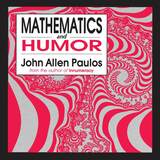
"Jokes, paradoxes, riddles, and the art of non-sequitur are revealed with great perception and insight in this illuminating account of the relationship between humor and mathematics."—Joseph Williams, New York Times
"'Leave your mind alone,' said a Thurber cartoon, and a really complete and convincing analysis of what humour is might spoil all jokes forever. This book avoids that danger. What it does. . .is describe broadly several kinds of mathematical theory and apply them to throw sidelights on how many kinds of jokes work."—New Scientist
"Many scholars nowadays write seriously about the ludicrous. Some merely manage to be dull. A few—like Paulos—are brilliant in an odd endeavor."—Los Angeles Times Book Review
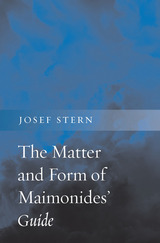
Maimonides’ Guide of the Perplexed has traditionally been read as an attempt to harmonize reason and revelation. Another, more recent interpretation takes the contradiction between philosophy and religion to be irreconcilable, and concludes that the Guide prescribes religion for the masses and philosophy for the elite. Moving beyond these familiar debates, Josef Stern argues that the perplexity addressed in this famously enigmatic work is not the conflict between Athens and Jerusalem but the tension between human matter and form, between the body and the intellect.
Maimonides’ philosophical tradition takes the perfect life to be intellectual: pure, undivided contemplation of all possible truths, from physics and cosmology to metaphysics and God. According to the Guide, this ideal cannot be realized by humans. Their embodied minds cannot achieve scientific knowledge of metaphysics, and their bodily impulses interfere with exclusive contemplation. Closely analyzing the arguments in the Guide and its original use of the parable as a medium of philosophical writing, Stern articulates Maimonides’ skepticism about human knowledge of metaphysics and his heterodox interpretations of scriptural and rabbinic parables. Stern shows how, in order to accommodate the conflicting demands of the intellect and the body, Maimonides creates a repertoire of spiritual exercises, reconceiving the Mosaic commandments as training for the life of the embodied mind. By focusing on the philosophical notions of matter and form, and the interplay between its literary form and subject matter, Stern succeeds in developing a unified, novel interpretation of the Guide.
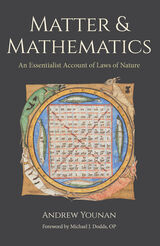
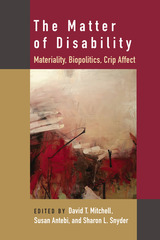
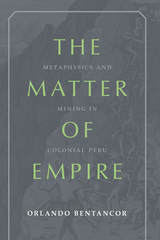
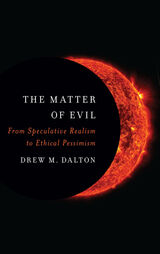
In this radical reconsideration of ethical reasoning in contemporary European philosophy, Drew M. Dalton makes the case for an absolutely grounded account of ethical normativity developed from a scientifically informed and purely materialistic metaphysics. Expanding on speculative realist arguments, Dalton argues that the limits placed on the nature of ethical judgments by Kant’s critique can be overcome through a moral evaluation of the laws of nature—specifically, the entropic principle that undergirds the laws of physics, chemistry, and biology. In order to extract a moral meaning from this simple material fact, Dalton scrutinizes the presumptions of classical accounts and traditional understandings of good and evil within the history of Western philosophy and ultimately asserts that ethical normativity can be reestablished absolutely without reverting to dogmatism.
By overturning our assumptions about the nature and value of reality, The Matter of Evil: From Speculative Realism to Ethical Pessimism presents a provocative new model of ethical responsibility that is both logically justifiable and scientifically sound. Dalton argues for “ethical pessimism,” a position previously marginalized in the West, as a means to cultivate an account of ethical responsibility and political activism that takes seriously the unbecoming of being and the moral horror of existence.
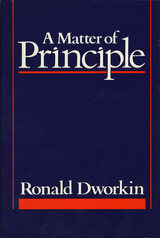
This is a book about the interplay of urgent political issues and hotly debated questions of moral philosophy. The controversies it joins are old; but history has given them fresh shape. For example, whether judges should and do make law is now of more practical importance than ever before, as recent presidents have appointed enough justices to the Supreme Court to set its character for a generation.
With forceful style, Ronald Dworkin addresses questions about the Anglo-American legal system as protector of individual rights and as machinery for furthering the common good. He discusses whether judges should make political decisions in hard cases; the balancing of individual rights versus the good of the community; whether a person has the right to do what society views as wrong; and the meaning of equality in any framework of social justice. Dworkin strongly opposes the idea that judges should aim at maximizing social wealth. It is his conviction that the area of discretion for judges is severely limited, that in a mature legal system one can always find in existing law a “right answer” for hard cases.
Dworkin helps us thread our way through many timely issues such as the rights and privileges of the press under the First Amendment. He reviews the Bakke case, which tested affirmative action programs. These essays also examine civil disobedience, especially in nuclear protests, and bring new perspective to the debate over support of the arts.
Above all, this is a book about the interplay between two levels of our political consciousness: practical problems and philosophical theory, matters of urgency and matters of principle. The concluding essay on press freedom expands the discussion of conflict between principle and policy into a warning. Though some defenders of the press blend the two in order to expand freedom of speech, the confusion they create does disservice to their aim and jeopardizes the genuine and fragile right of free speech. We stand in greater danger of compromising that right than of losing the most obvious policy benefits of powerful investigative reporting and should therefore beware the danger to liberty of confusing the two. The caution is general. If we care so little for principle that we dress policy in its colors when this suits our purpose, we cheapen principle and diminish its authority.
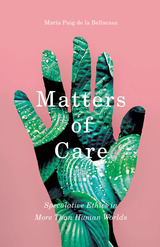
To care can feel good, or it can feel bad. It can do good, it can oppress. But what is care? A moral obligation? A burden? A joy? Is it only human? In Matters of Care, María Puig de la Bellacasa presents a powerful challenge to conventional notions of care, exploring its significance as an ethical and political obligation for thinking in the more than human worlds of technoscience and naturecultures.
Matters of Care contests the view that care is something only humans do, and argues for extending to non-humans the consideration of agencies and communities that make the living web of care by considering how care circulates in the natural world. The first of the book’s two parts, “Knowledge Politics,” defines the motivations for expanding the ethico-political meanings of care, focusing on discussions in science and technology that engage with sociotechnical assemblages and objects as lively, politically charged “things.” The second part, “Speculative Ethics in Antiecological Times,” considers everyday ecologies of sustaining and perpetuating life for their potential to transform our entrenched relations to natural worlds as “resources.”
From the ethics and politics of care to experiential research on care to feminist science and technology studies, Matters of Care is a singular contribution to an emerging interdisciplinary debate that expands agency beyond the human to ask how our understandings of care must shift if we broaden the world.
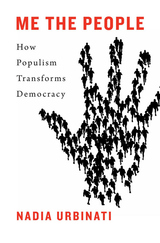
A timely and incisive assessment of what the success of populism means for democracy.
Populist movements have recently appeared in nearly every democracy around the world. Yet our grasp of this disruptive political phenomenon remains woefully inadequate. Politicians of all stripes appeal to the interests of the people, and every opposition party campaigns against the current establishment. What, then, distinguishes populism from run-of-the-mill democratic politics? And why should we be concerned by its rise?
In Me the People, Nadia Urbinati argues that populism should be regarded as a new form of representative government, one based on a direct relationship between the leader and those the leader defines as the “good” or “right” people. Populist leaders claim to speak to and for the people without the need for intermediaries—in particular, political parties and independent media—whom they blame for betraying the interests of the ordinary many. Urbinati shows that, while populist governments remain importantly distinct from dictatorial or fascist regimes, their dependence on the will of the leader, along with their willingness to exclude the interests of those deemed outside the bounds of the “good” or “right” people, stretches constitutional democracy to its limits and opens a pathway to authoritarianism.
Weaving together theoretical analysis, the history of political thought, and current affairs, Me the People presents an original and illuminating account of populism and its relation to democracy.
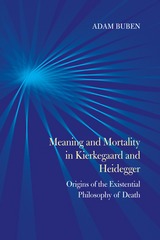
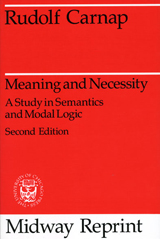
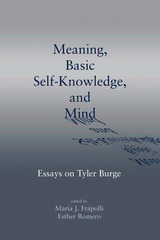
The authors of the eleven papers here expound their versions of this position and go on to critique Burge's version. Together with Burge's replies, this volume offers a major contribution to contemporary philosophy.
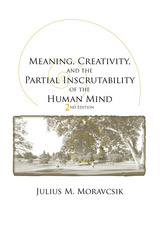
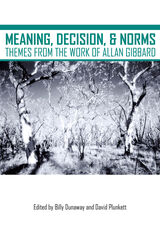
This volume is not a collection of artifacts from past decades of philosophy. Instead, it is a collection of essays that each make a significant contribution to contemporary work in philosophy. This reflects the fact that Gibbard’s work has not only had a massive influence on past discussion in philosophy but also continues to influence new directions of philosophical research.
With contributions from:
Sara Aronowitz, Simon Blackburn, Paul Boghossian, David Braddon-Mitchell, Nate Charlow, Stephen Darwall, Jamie Dreier, Billy Dunaway, Melissa Fusco, Sona Ghosh, Allan Gibbard, Bill Harper, Paul Horwich, Zoë Johnson King, Tristram McPherson, Howard Nye, Lauren Olin, Caleb Perl, David Plunkett, Peter Railton, Connie Rosati, Mark Schroeder, Alex Silk, Daniel J. Singer, Brian Skyrms, and Seth Yalcin.
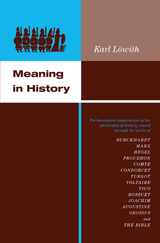
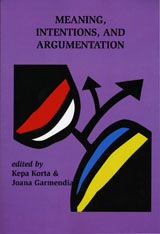
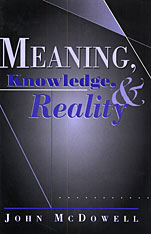
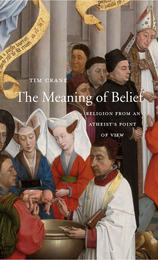
“[A] lucid and thoughtful book… In a spirit of reconciliation, Crane proposes to paint a more accurate picture of religion for his fellow unbelievers.” —James Ryerson, New York Times Book Review
Contemporary debate about religion seems to be going nowhere. Atheists persist with their arguments, many plausible and some unanswerable, but these make no impact on religious believers. Defenders of religion find atheists equally unwilling to cede ground. The Meaning of Belief offers a way out of this stalemate.
An atheist himself, Tim Crane writes that there is a fundamental flaw with most atheists’ basic approach: religion is not what they think it is. Atheists tend to treat religion as a kind of primitive cosmology, as the sort of explanation of the universe that science offers. They conclude that religious believers are irrational, superstitious, and bigoted. But this view of religion is almost entirely inaccurate. Crane offers an alternative account based on two ideas. The first is the idea of a religious impulse: the sense people have of something transcending the world of ordinary experience, even if it cannot be explicitly articulated. The second is the idea of identification: the fact that religion involves belonging to a specific social group and participating in practices that reinforce the bonds of belonging. Once these ideas are properly understood, the inadequacy of atheists’ conventional conception of religion emerges.
The Meaning of Belief does not assess the truth or falsehood of religion. Rather, it looks at the meaning of religious belief and offers a way of understanding it that both makes sense of current debate and also suggests what more intellectually responsible and practically effective attitudes atheists might take to the phenomenon of religion.
READERS
Browse our collection.
PUBLISHERS
See BiblioVault's publisher services.
STUDENT SERVICES
Files for college accessibility offices.
UChicago Accessibility Resources
home | accessibility | search | about | contact us
BiblioVault ® 2001 - 2024
The University of Chicago Press





